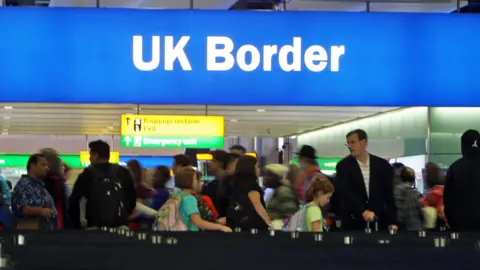Brexit: What changes for EU and UK citizens living abroad?
 PA Media
PA MediaAfter Brexit day on Friday 31 January, nothing will immediately change for European Union (EU) citizens living in the UK, or UK citizens living in the EU. So when will things change - and what happens then?
What happens next
After 31 January, the UK will enter a transition period with the EU to allow both sides to negotiate their future relationship. This is due to last until 31 December 2020 and during this time the UK will still be bound by EU laws.
That means freedom of movement (which allows EU citizens the right to live and work in the UK and gives UK citizens the right to do the same in EU countries) will continue during this phase.
It means that an EU passport or identity card will still be valid proof to rent and work.
The government plans to pass a law in the next year which will end EU citizens' freedom of movement from the end of the transition. That means they will need a visa to work or live in the UK long term.
What about EU citizens already in the UK?
The UK government has said it will protect the rights of any EU citizens already living in the UK on 31 December 2020 - currently roughly 3.5 million people.
While they have the right to remain, they must apply for a new legal status in order to prove this.
To do this, they will have to register with the government's EU settlement scheme, which is open until 30 June 2021.
Applying to the scheme
Anyone who can prove they have been in the UK continuously for five years or more should be eligible for settled status, which must be applied for online.
A wide range of documents are accepted, from national insurance numbers to letters from employers, rental agreements and household bills.
Those living in the UK for shorter periods of time should qualify for pre-settled status, which can be upgraded to settled status once the applicant has reached the five-year milestone.
Here, there is a wider range of acceptable evidence including plane tickets and passport stamps confirming the date of entry at the UK border.
If you have settled status, you can then spend up to five years in a row outside the UK without losing your status. If you have pre-settled status, it is two years.
Campaigners have raised concerns that people who do not know they have to apply to the scheme could find themselves unable to prove that they are in the country legally. They say this could create problems with employers, renting a property or accessing healthcare and, down the line, could potentially open up the possibility of deportation.
A Home Office spokesperson said, "EU citizens are our friends, family and neighbours...the EU Settlement Scheme has already granted status to 2.5 million people so they can stay."
What about EU citizens arriving after Brexit?
During the transition period, EU citizens will have the right to move to the UK and to remain - as long as they apply to the government's EU settlement scheme.
Anyone arriving after the end of transition will have to meet the requirements set out by a future immigration system in order to stay in the country.
The government has not set out how such a system will work.
UK citizens in the EU
The number of UK-born people living in the EU - workers and their dependants, pensioners, students and others - is estimated at 1.3 million.
For UK citizens who are currently living in one of the EU's other 27 countries, nothing will change during the transition - that is, until the end of 2020.
But they may need to apply for a residence status to confirm that they were already resident in the EU country before 31 December 2020. They will, like EU citizens in the UK, have until at least 30 June 2021 to do so.
The UK government website provides country-by-country guides on what to do if you are a UK national currently working, studying or receiving a pension in the EU, or planning to do so in the future.
If a UK national wants to return to the UK from the EU after Brexit and wants to bring with them their close family members (children, spouses, partners, parents and grandparents), who have EU citizenship, they will be able to do so without the need for a visa until 29 March 2022.
After this date, the family members will need to apply for a visa.



